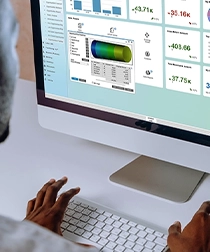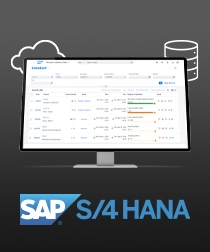HubSpot CRM, the Swiss Army Knife
for Your Business !
Why combine ERP with CRM ?
Integrating a Customer Relationship Management (CRM) system in tandem with an Enterprise Resource Planning (ERP) system offers undeniable strategic synergy for modern businesses.
While ERP focuses on streamlining internal operations such as inventory management, accounting and the supply chain, CRM completes the picture by focusing on customer interactions. By combining these two systems, companies create a complete information ecosystem, enabling a 360-degree view of every aspect of their operations.
What is HubSpot CRM?
HubSpot CRM is a customer relationship management (CRM) platform widely used by companies to centralize, organize and optimize their interactions with customers. HubSpot offers a suite of CRM, marketing, sales and customer service tools, all integrated into a single platform. HubSpot CRM is designed to help companies develop and maintain strong, lasting customer relationships.
In this blog post, we’ll outline Hubspot’s multitasking prowess. From lead generation to customer retention, discover how this all-in-one CRM tool can be your faithful companion as you navigate the complexities of modern marketing.
What does integrating HubSpot CRM with SAP ERP enable ?
Streamlined Data Flow:
Connecting SAP ERP and HubSpot CRM ensures seamless data synchronization between sales, marketing, and operations, leading to accurate and up-to-date information across the organization.
Enhanced Customer Insights:
The integration enables a comprehensive view of customer interactions, allowing teams to better understand customer behavior, preferences, and needs for personalized engagement.
Efficient Lead Management:
Leads generated in HubSpot CRM can be directly passed to SAP ERP for efficient conversion into opportunities and orders, reducing manual data entry and minimizing errors.
Automated Workflows:
Integration empowers automated processes, such as order fulfillment, inventory management, and invoicing, optimizing operations and reducing the time required to complete tasks.
Improved Sales Performance:
Sales teams can access real-time inventory data and order history from SAP ERP within HubSpot CRM, enabling more informed conversations and faster order processing.
Holistic Reporting:
By combining sales and customer data from both platforms, organizations gain insights into end-to-end customer journeys, helping in identifying trends, forecasting, and strategic decision-making.
Consistent Customer Experience:
Seamless integration ensures that customer information is consistent and updated in both systems, promoting a unified customer experience across departments.
Time and Cost Savings:
Eliminating manual data entry, reducing duplication, and minimizing errors lead to operational efficiency, saving time and resources.
Scalability:
The integrated system can adapt to the growing needs of the business, accommodating increased data volume and complexity without compromising performance.
Better Marketing Alignment:
Integration facilitates collaboration between sales and marketing teams, enabling more targeted campaigns based on real-time sales data and customer behavior.
In summary, connecting SAP ERP to HubSpot CRM streamlines processes, enhances customer insights, and fosters collaboration between departments, ultimately contributing to improved customer relationships and business growth.
SAP integration with HubSpot CRM is a powerful combination that enables organizations to leverage the powerful SAP ERP system while taking advantage of HubSpot’s marketing automation capabilities. Organizations can automate their business processes, streamline data flows, and gain deeper insights into customer activities by integrating SAP and HubSpot.
This integration also allows the sync of customer information between SAP and HubSpot, such as contact details, sales orders, and product information. This will enable organizations to work seamlessly across different platforms and provides more opportunities for businesses to increase revenue and improve customer satisfaction.
Ultimately, integrating CRM with ERP is not simply a technological juxtaposition, but a sound strategy that catalyzes growth, improves operational efficiency and fosters strong customer relationships, all contributing to a sustainable competitive advantage in today’s demanding marketplace.
Test HubSpot CRM. Meet our Team.




